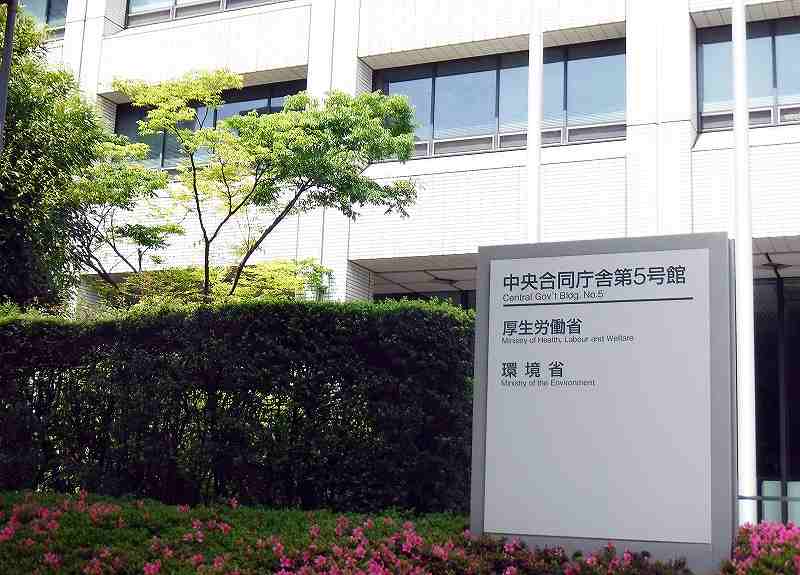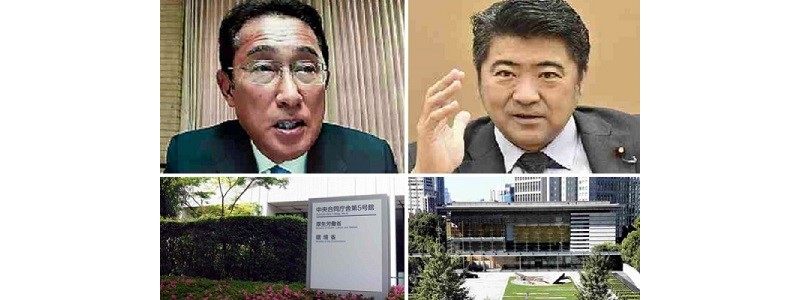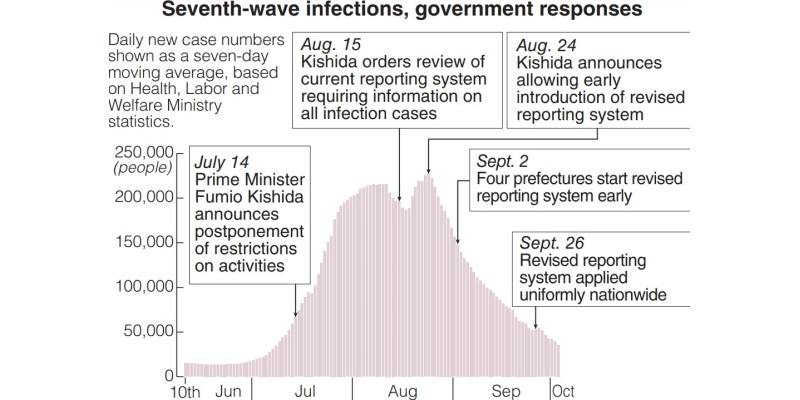
The Health, Labor and Welfare Ministry
13:33 JST, October 6, 2022
Minister Fumio Kishida’s Cabinet has passed the first anniversary of its inauguration with its approval rating on the decline. This series examines how Kishida’s political style so far has affected the handling of key issues and what the future holds for his administration.
***
“End the public spending? That’s impossible,” Deputy Chief Cabinet Secretary Seiji Kihara, 52, said.
He was rejecting a plan that Assistant Chief Cabinet Secretary Takeshi Fujii, 59, a former Finance Ministry official, had presented with senior officials from the Health, Labor and Welfare Ministry on Aug. 22 at the Prime Minister’s Office.
The plan proposed to cut public spending on treatment for COVID-19 and require patients to pay part of their own medical costs. However, it was easy for Kihara to imagine that the plan would trigger public opposition.
The health ministry was considering the reduction of public spending as a main measure of a “living with COVID” policy, along with a review of the current reporting system that requires detailed information on all infection cases, such as the names of all infected patients. The ministry intended to communicate the plan to Hirotaka Unami, 57, an executive secretary to the prime minister in charge of the COVID-19 response, and have Prime Minister Fumio Kishida, 65, who was then recuperating at home after being infected with the novel coronavirus himself, announce the plan on Aug. 24.
However, that plan was scrapped.

Clockwise from top left: Fumio Kishida, Seiji Kihara, the Prime Minister’s Office and the Health, Labor and Welfare Ministry
Governors caught by surprise
Meanwhile, disagreement within the government came to light over reviewing the current infection reporting system.
Until late August, officials including Unami and the health ministry made arrangements to take a two-phase approach — reviewing the current reporting system uniformly across the nation as early as late September while also allowing prefectures to introduce a revised system ahead of schedule. They made some behind-the-scenes arrangements with the National Governors’ Association and the Japan Medical Association.
Until just before announcing the plan on Aug. 24, arguments continued over what to announce. In the final meeting, Kihara reportedly told Unami, “Given that the number of infections continues to increase, we should not talk about the future,” and insisted that they should only announce that an earlier implementation of the revised reporting system would be allowed. While Unami initially stuck to his argument that the plan would be difficult to understand without presenting the overall schedule, he finally relented.
In the announcement made via online video, Kishida used a vague expression in referring to a uniform review of the reporting system across the nation, saying, “We would like to promote relevant measures.”
However, the topic of the early implementation was a complete surprise for many prefectural governors. Obviously, the behind-the-scenes arrangements had been insufficient, with many governors saying in bewilderment, “That’s not what I heard” or “I want the central government to make a uniform decision for the entire country.”
Three days later, Kishida told reporters, “The government still plans to introduce a revised reporting system uniformly across the nation,” as the central government wound up being forced to calm the situation.
Kihara, who has been elected five times to the House of Representatives and belongs to the Kishida faction, is the closest aide to the prime minister. In the Kasumigaseki bureaucratic district, it was rumored that Kihara had upset the apple cart. On the contrary, however, the deputy chief cabinet secretary did not find the bureaucrats’ handling of the matter convincing, as he thought the message conveyed to the public should be carefully but flexibly adjusted in light of the COVID situation and public opinion.
Originally, the revised reporting system was supposed to be applied after the end of the seventh wave of coronavirus infections. It was to be accompanied by measures including the drastic easing of COVID-19 border control measures. However, the seventh wave lasted longer than expected and the number of infection cases began increasing again in late August. While Kihara thought it was not a good idea to announce the “living with COVID” policy at that time, his idea was not shared within the Prime Minister’s Office.
Broad discretion
The decision-making process in the Prime Minister’s Office is an important consideration for gauging the stability of government management.
Under the second Cabinet of former Prime Minister Shinzo Abe, Takaya Imai, now 64, was an executive secretary to the prime minister, who kept his eye on various areas and had great influence.
Under the administration of former Prime Minister Yoshihide Suga, Suga took care of everything on his own. Once Suga made a decision, things moved quickly, but when there were too many things he needed to handle, the situation frequently faced bottlenecks.
Kishida’s style is to give a lot of discretion to his eight executive secretaries and make decisions himself at the final stage. These secretaries are all hotshots in their respective government ministries and agencies, such as former bureau directors. Among them is Takashi Shimada, 62, former vice economy, trade and industry minister.
Furthermore, Masafumi Mori, 63, a special adviser to the prime minister and former vice land, infrastructure, transport and tourism minister, and Shunichi Kuryu, 63, deputy chief cabinet secretary and former director of the National Police Agency, support them as coordinators. Kihara participates in decision-making as well, bringing political perspective.
With such heavyweights serving as staff, Chief Cabinet Secretary Hirokazu Matsuno, 60, who is supposed to play a coordinating role, has less influence.
“Team Kishida” is capable of making quick decisions when the members mesh well with each other, such as when it strengthened COVID-19 border measures in November last year. However, when communication among them fails, inconsistencies come to light. The Cabinet approval rating has been declining since summer, which has undermined the leadership of the Prime Minister’s Office, and ministry and agency officials almost publicly express their discontent, with a senior Finance Ministry official saying: “There are too many commanders. Even if we obtain approval from one of them, it will be overturned if others say, “That’s the first I’ve heard of this.”
Kishida is being tested as to whether he will be able to coordinate and lead his team again in moving the country into recovery from the pandemic.
‘Living with COVID’
The Kishida Cabinet is promoting measures for living with the coronavirus to help people get back to normal life, with an eye on the end of the seventh wave of infections.
The prevalent mainstream omicron variant is less likely to cause severe symptoms and is now more like an ordinary infectious disease agent. For that reason, the Cabinet aims to bring various regulations and systems back to normal in a gradual manner.
The treatment costs for the coronavirus are now funded by medical insurance and other taxpayer money; patients do not have to pay out of their own pockets. This is based on the idea that, if the government asks people to be hospitalized or stay at home in order to prevent infections from spreading, then the government should pay the costs. Until late August, the health ministry had considered continuing public spending on hospitalization and testing, and treatment costs for outpatients in the same manner as those of treatment for ordinary diseases.

Top Articles in Politics
-

Japan PM Takaichi’s Cabinet Resigns en Masse
-

Sanae Takaichi Elected Prime Minister of Japan; Keeps All Cabinet Appointees from Previous Term
-

Japan’s Govt to Submit Road Map for Growth Strategy in March, PM Takaichi to Announce in Upcoming Policy Speech
-

LDP Wins Historic Landslide Victory
-

LDP Wins Landslide Victory, Secures Single-party Majority; Ruling Coalition with JIP Poised to Secure Over 300 seats (UPDATE 1)
JN ACCESS RANKING
-

Japan PM Takaichi’s Cabinet Resigns en Masse
-

Japan Institute to Use Domestic Commercial Optical Lattice Clock to Set Japan Standard Time
-

Israeli Ambassador to Japan Speaks about Japan’s Role in the Reconstruction of Gaza
-

Man Infected with Measles Reportedly Dined at Restaurant in Tokyo Station
-

Videos Plagiarized, Reposted with False Subtitles Claiming ‘Ryukyu Belongs to China’; Anti-China False Information Also Posted in Japan
























